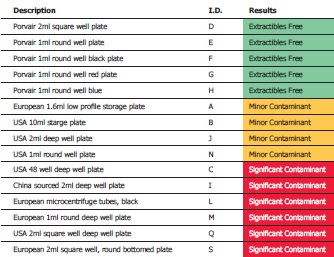Study Investigates Inherent Contamination in Deep Well Microplates

A recent study by the Department of Chemistry at the University of Kent, UK provides a detailed analysis of deep well microplates and the significant levels of contamination found in more than 50% of the commercially available plates tested.
The study, following on from an earlier study in 2005, gives data on a large range of microplates from numerous manufacturers based in Europe, US and China. Mass spectral data shows that persistent contamination from a range of compounds found in the raw polymer master batch continues to be evident in many of the microplates tested. The effect of extractables leached out of the deep well plates identified in this report depends on the exact application for which the plate was designed but is highly likely to significantly affect their performance and contaminate samples stored in them.
The authors of the report conclude it is likely that a low grade polypropylene was used in the production of many of the microplates that leached extractables when tested. Such low grade polypropylene often contains flow modifier additives or “mould release agents” which will have been used to ease the manufacturing process and help free the moulded microplate from the mould respectively. The solvent used for "extraction" of potential leachates in this study was methanol. As mass spectral testing was undertaken after only 24 hours, it is clear that samples do not have to be in these plates for very long before they can become contaminated.
For a copy of this report 'Controlling contamination in deep well microplates' please visit the downloads section of www.microplates.com
Related News
-
News Patients vs Pharma – who will the Inflation Reduction Act affect the most?
The Inflation Reduction Act brought in by the Biden administration in 2022 aims to give better and more equitable access to healthcare in the USA. However, pharma companies are now concerned about the other potential costs of such legislation. -
News CPHI Podcast Series: What does the changing US Pharma market mean for industry and patients alike?
In this week's episode of the CPHI Podcast Series Lucy Chard, Digital Editor for CPHI Online is joined by James Manser to discuss the political and market changes in the US pharma field. -
News CPHI Barcelona Annual Report illuminates industry trends for 2024
The CPHI Annual Survey comes into it’s 7th year to report on the predicted trends for 2024. Over 250 pharma executives were asked 35 questions, with their answers informing the industry landscape for the next year, spanning all major pharma marke... -
News Which 10 drugs are open to price negotiation with Medicare in the USA?
The Centres for Medicare & Medicaid Services, under the Biden administration in the USA, has released a list of the 10 drugs that will be open to price negotiations as part of the new legislation under the Inflation Reduction Act (IRA). -
News EU Medical Devices Regulation causes unintended disappearances of medical devices for children, doctors state
Doctor groups and associations have appealed to the EU to correct the EU Medical Devices Regulation law that may cause unintended shortages of essential drug and medical devices for children and rare disease patients. -
News 10 Major Drug Approvals So Far in 2023
Last year, 37 novel drugs were approved by the FDA, this was a high number for such a category, and covered many fields including oncology, demonstrating how promising further research is, and how it is only continuing to build. To date, there are alre... -
News Detecting Alzheimer's disease with a simple lateral flow test
A novel rapid diagnostic test for early-stage Alzheimer's disease has been developed using a biomarker binder from Aptamer Group along with technology from Neuro-Bio, the neurodegenerative disease experts. -
News CPHI Podcast Series: outsourcing and manufacturing trends
Listen to the CPHI Podcast Series this June to hear Gil Roth of the PBOA speak with Digital Editor Lucy Chard about the biggest trends and topics to watch in pharma outsourcing and manufacturing at the minute.
Position your company at the heart of the global Pharma industry with a CPHI Online membership
-
Your products and solutions visible to thousands of visitors within the largest Pharma marketplace
-
Generate high-quality, engaged leads for your business, all year round
-
Promote your business as the industry’s thought-leader by hosting your reports, brochures and videos within your profile
-
Your company’s profile boosted at all participating CPHI events
-
An easy-to-use platform with a detailed dashboard showing your leads and performance







